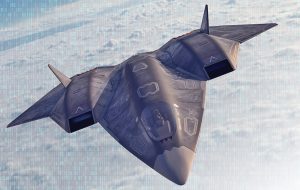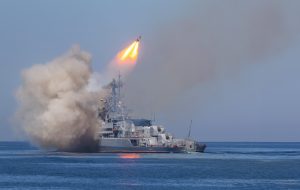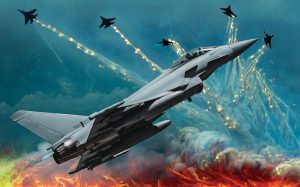In June 2022, Russian President Vladimir Putin stressed that the Collective Security Treaty Organization (CSTO) plays a vital and expanding role at this stage, confirming in his conversation with his Belarusian counterpart, Alexander Lukashenko, the importance of mobilizing the efforts of the member countries. President Putin said, “Russia shouldn’t face NATO’s expansion efforts alone”, which is a statement that reflects Russia’s attempt to revive an anti-NATO military alliance, especially after Finland and Sweden expressed the desire to join NATO, raising the question of whether Moscow can succeed in establishing a military alliance that counter-balances NATO.
In 1955, Russia established the “Warsaw Pact” as a military alliance, in response to Washington’s founding of the North Atlantic Treaty Organization (NATO), however, this alliance disbanded quickly in February 1991, following the collapse of the Soviet Union.

Since then, Russia sought to establish an alternative military alliance, which can be detailed as follows:
1- The establishment of the Collective Security Treaty In 1992, a year after the collapse of the Warsaw Pact, The Commonwealth of Independent States, a loose coalition of post-Soviet states, signed the Collective Security Treaty. Two years later in 1994, the treaty consisting of Armenia, Georgia, Belarus, Kazakhstan, Kyrgyzstan, Russia, Tajikistan, Azerbaijan, and Uzbekistan, went into effect. The purpose of this treaty was to help coordinate military policies among the countries of the former Soviet Union, however, it failed to achieve any real military integration, as 3 of the 9 members, (Azerbaijan, Georgia, and Uzbekistan), chose to withdraw from the treaty in 1999, during its renewal, reducing the number of its members to only 6 countries.
2- The Activation of the Collective Security Treaty Organization When Vladimir Putin became the Russian president in 1999, the Kremlin began to take practical steps to modernize and strengthen the organization, which included granting the Collective Security Treaty the status of an “international regional organization”, changing its name to the Collective Security Organization Treaty, increasing military exercises and integration between member states, and establishing the organization’s collective rapid response forces in 2009, which aims to accomplish tasks of military and special nature”. However, due to the decline of security threats in its immediate vicinity, and the American preoccupation with Afghanistan, this organization could not carry out any major military operation during this time, but after the American withdrawal from Afghanistan in the middle of 2021, Russia began to assume an increasing security role outside its borders, which was most prominent in two major incidents:
First military exercises between Russia, Uzbekistan, and Tajikistan in August 2021, which are being held in a Tajik training field near the border with Afghanistan, and according to the Russian military, aim to enhance coordination between the forces of the three countries to counter the new threats that may arise from the withdrawal of NATO forces from Afghanistan in September 2021. Although these exercises took place outside the framework of the Collective Security Treaty Organization, they were an indication that Moscow is seeking to enhance its security role in the region after the US withdrew from it, presenting itself as the main security guarantor, with great success.
On the other hand, both Moscow and Tajikistan are members of the Collective Security Treaty Organization, meaning that the role of the organization can increase during the coming period, whether through the increase in the number of its members or by the expansion of its roles.
Second on January 6, 2022, Moscow sent the forces of the Collective Security Treaty Organization (composed mainly of Russian forces), to Kazakhstan to support its President Kassem Tokayev, who is facing mass protests that developed into massive riots in January 2022.
Although Article 4 of the CSTO charter states that the organization can only send forces to assist a member state against an external threat to its territory or sovereignty, and these popular protests didn’t fulfill the previous condition, the Russian narrative was based on the fact that the protests were orchestrated by internal and external elements, with the internal elements being the former President Nursultan Nazarbayev and the external forces being the United States.
For its part, Western media rushed to portray what happened in Kazakhstan as a popular uprising against corruption, and the former American ambassador to Kazakhstan, William Courtney, Tweeted that “the people of Kazakhstan know that this is a popular uprising against corrupt authoritarian rule, not an act of aggression by terrorist gangs trained abroad,” in response to the Kazakh authorities’ announcement of the arrest of terrorist groups that participated in the attack on vital installations in Kazakhstan during violent protests. Whatever the case, the fact is the Russian forces, numbering about 2,500 soldiers, managed to restore stability in less than a week, as the Russian forces began withdrawing from Kazakhstan by January 13, after they managed to quell the unrest and arrest some of the main instigators of sabotage operations, whether they were terrorist groups or leaders of organized crime groups. On the other hand, Russia is very popular in Kazakhstan, as 81 percent of the Kazakh people view Russia as a reliable and friendly country, unlike the United States and China.
The more profound strategic implication of the Russian intervention in Kazakhstan under the umbrella of the Collective Security Treaty Organization are that Moscow, not Washington, has become the main security guarantor of central Asian countries, especially to the member states of the organization.
3- The meeting of the organization during the Ukrainian war On June 16, 2022, more than two months after the outbreak of the Ukrainian war, Russian President Vladimir Putin said that the CSTO plays a vital role in achieving stability in the post-Soviet space, expressing his hope for the increase of its capabilities and influence. These statements came on the sidelines of Moscow’s hosting, on the same day as the summit of the leaders of the CSTO, where they are scheduled to discuss improving the organization’s peacekeeping capabilities, in addition to strengthening military cooperation among its members. Putin’s statements, as well as the stated goals of the meeting, reveal Moscow’s desire to raise the level of military cooperation between member states to become a military alliance capable of facing NATO’s threats.
The Kremlin’s position was clearest in the words of Belarusian President Alexander Lukashenko, who addressed the recent CSTO summit saying that “without a rapid mobilization of the CSTO on a united front, all its countries will suffer.” Lukashenko then added, “If had acted as a united front from the start, we wouldn’t be facing these infernal sanctions, and Russia should not have to face the efforts to expand NATO alone,” explaining that the West is waging a large-scale hybrid aggressive campaign against Belarus and Russia.
He also criticized the organization for its lack of solidarity with Russia and Belarus, as its members succumbed to Western pressure and failed to support the two countries in their time of need, indicating the Kremlin’s desire to form a united front to counterbalance the West politically and economically if not militarily, to raise the cost of Economic sanctions against Moscow.

Moscow’s goals
The Russian efforts to revive the military alliance at this time are clearly linked to the larger conflict between Moscow and Washington, which is partly unfolding on Ukrainian soil now.
By reviewing the official statements issued by other member states of the organization, it becomes clear that Moscow failed to influence their positions in a manner that pushes them to adopt the same Russian positions on the Ukrainian war, or even to announce the development of the organization in a way that satisfies the Kremlin. However, Moscow is expected to continue its efforts to develop the organization, especially after the end of the Ukrainian war, and it can be said that the Russian goals of reactivating the Collective Security Organization Treaty are as follows:
1- Responding to NATO’s expansion: All former members of the Warsaw Pact have joined NATO, with Poland, the Czech Republic, and Hungary joining in 1999, Slovakia, Romania, and Bulgaria in 2004, and Albania in 2009. In mid-2022, Finland and Sweden requested accession to NATO, in what is believed to be an attempt by Washington to raise the costs of the Russian military operation in Ukraine, at least from a geopolitical perspective, i.e. the claim that the Russian war against Ukraine, which aimed to prevent its accession to NATO, may have negative repercussions represented in the accession of two other countries to the alliance.
2- Evading sanctions: Western countries fear that Moscow will take advantage of its close relations with the member states of the treaty to evade Western sanctions, and there are several indications for this, including the estimation of some European reports that there is a tenfold increase in the number of Russian companies registered in Kazakhstan.
About 1,348 new Russian companies were registered from March to May, in addition to the Russian government facilitating import from abroad with parallel import permissions, i.e. without the consent of the intellectual property owner, which effectively legalizes the smuggling of foreign goods. Member States of the Treaty Organization can also covertly provide military-technical assistance to the Russian coalition, through existing channels of military-technical cooperation.
According to Western estimates, Kazakhstan is one of the most likely countries to play this role, given that it is not subject to Western sanctions and that Russia controls many military and industrial complexes in Kazakhstan, which are still operating at full capacity unaffected by Western sanctions. One such example is the unsanctioned Kazakhstani Baikonur cosmodrome leased by Russia, which serves as the main development platform for the Russian space company Roscosmos, and directly supports the Russian aerospace and military industries.
Another example is the Kazakhstan Engineering Corporation, a state-owned military company, which is also assisting the Russian defense industry.
In addition, Kazakhstan and Russia may have an opportunity to enhance cooperation in the automotive industry, particularly in the development of components and spare parts, as Kazakhstan is witnessing an increase in car production and manufactures many Russian brands of cars such as Lada and commercial vehicles, and given the military needs of Russian and its ongoing war in Ukraine, the Kremlin aims to take advantage of these projects to gain access to equipment, spare parts, and certain technological tools that Russia cannot reach directly due to sanctions.
3- Expanding the organization’s membership: The Secretary-General of the Collective Security Treaty Organization, Stanislav Zas, emphasized that his organization, and the Shanghai Cooperation Organization, which is dominated by China, share many assessments and visions about security, especially the rejection of NATO expansion, therefore, there may be a reason to strengthen cooperation between China and the organization, and there are a number of factors that may drive both organizations in this direction, most notably of which is the escalation of Russian-Chinese military cooperation, which has taken several dimensions, especially the conduct of joint military maneuvers and exercises, including Chinese and Russian strategic fighters conducting joint aerial operations over the Sea of Japan and the East China Sea, on 24 May, coinciding with the summit of the leaders of the Quad Alliance for Security Dialogue in Tokyo, which was attended by US President Joe Biden, through which he aimed to coordinate among Asian countries to establish an alliance to encircle China.
On the other hand, the participation of South Korea and Japan in the NATO meetings in Madrid in June 2022, as well as South Korea’s talk of entering into a new cooperation program between South Korea and NATO in the latter half of this year, indicates the increased involvement of NATO in the security issues of South East Asia, which means the possibility of using NATO to curb Chinese expansion, which is the declared US goal behind the establishment of the Ocos and Quad alliances, and there is no doubt that such a development may push China to strengthen military cooperation with Russia, especially with Washington’s support for Taiwan’s efforts to separate from China.
In conclusion, Russia was unable to achieve its full objectives by activating and developing the Collective Security Treaty Organization, to respond to the expansion of NATO, near its borders, however, Russian efforts have not stop, and there are accusations that some members of NATO are involved in helping Russia evade Western sanctions. Western countries are likely to be wary of imposing any direct sanctions on these countries, given that such sanctions will push these countries to cooperate more with Moscow against the will of the West. On the other hand, the continued American escalation against Russia and China will push them to cooperate more together and to develop institutional mechanisms for cooperation in confronting Western threats to their security and national interests.
« By: Dr. Shadi Abdel Wahab
(military researcher and strategist)













